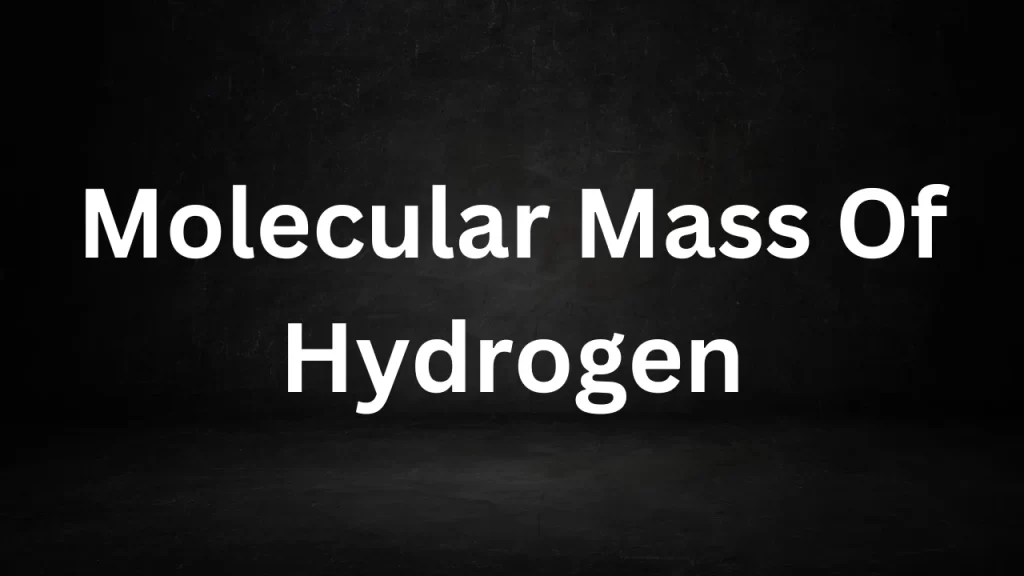Tag: 30 h2o2 molar mass
Molecular Mass Of Hydrogen
Molecular Mass Of Hydrogen: H2, the lightest and most abundant element in the universe, plays a fundamental role in chemistry, physics, and astrophysics.
One key aspect of H2 is its molecular mass, a concept that underpins our understanding of chemical reactions, gas properties, and the composition of matter. In this article, we will explore the molecular mass of H2 and its significance.

Molecular Mass Of Hydrogen
The Basics of Molecular Mass
Molecular mass, also known as molecular weight or molar mass, is a crucial concept in chemistry. It represents the mass of a molecule and is typically expressed in atomic mass units (u) or unified atomic mass units (AMU). Molecular mass is calculated by summing the atomic masses of all the atoms in a molecule.
Hydrogen: The Simplest Element
H2 is the simplest and lightest element in the periodic table. It has an atomic number of 1, indicating that it has one proton in its nucleus. The most common and stable form of hydrogen is the diatomic molecule H2, where two hydrogen atoms are chemically bonded together.
Atomic Mass of Hydrogen
The atomic mass of H2 is approximately 1.00784 atomic mass units (u). This value accounts for the most common isotope of hydrogen, known as protium (¹H), which consists of one proton and one electron.
Calculating the Molecular Mass of Hydrogen (H2)
To calculate the molecular mass of hydrogen (H2), we simply add the atomic masses of the two hydrogen atoms in the molecule:
Molecular Mass of Hydrogen (H2) = (Atomic Mass of H2) x 2 Molecular Mass of Hydrogen (H2) ≈ (1.00784 u) x 2 ≈ 2.01588 u
Rounded to four decimal places, the molecular mass of hydrogen (H2) is approximately 2.0159 atomic mass units (u).
Significance of Hydrogen’s Molecular Mass
Understanding the molecular mass of H2 is of paramount importance in various scientific and practical contexts:
- Chemical Reactions: In chemical reactions involving hydrogen, its molecular mass is crucial for stoichiometry calculations. It helps determine the amount of H2 required or produced in a reaction.
- Gas Properties: H2 is used as a fuel and in gas mixtures for various applications. Its molecular mass influences its behavior as a gas, including density, solubility, and combustion properties.
- Energy Storage: Hydrogen is considered a clean and efficient energy carrier. Its molecular mass affects the energy density of hydrogen fuels and their storage and transportation.
- Astrophysics: Understanding the molecular mass of H2 is vital in astrophysics, where H2 is the primary element in stars and the universe’s most abundant element.
- H2 Bonding: H2 bonds with other elements and molecules, and its molecular mass influences the strength and characteristics of these bonds.
- Fuel Cells: In H2 fuel cells, which are used for power generation and transportation, the molecular mass of H2 plays a role in efficiency calculations.
Conclusion
The molecular mass of hydrogen (H2), approximately 2.0159 atomic mass units (u), is a fundamental property of this elemental gas. Its significance extends from the microscopic world of chemical reactions to the vast reaches of the universe in astrophysics. Whether it’s powering vehicles, fueling stars, or driving chemical reactions in the laboratory, the molecular mass of H2 is a foundational concept that enriches our understanding of the physical and chemical properties of matter.
Read More
- Molecular Mass Of Nacl
- Molecular Mass Of Naoh
- Molecular Mass Of Nitrogen
- Molecular Weight Of Glucose
- Molecular Mass Of Oxygen
Frequently Asked Question (FAQs) Molecular Mass Of H2
1. What is the molecular mass of hydrogen (H2)?
The molecular mass of hydrogen (H2) is approximately 2.0159 atomic mass units (u). This value is calculated by adding the atomic masses of the two H2 atoms in the molecule.
2. Why is the molecular mass of H2 significant?
The molecular mass of H2 is essential in various scientific fields, including chemistry, physics, and astrophysics. It influences chemical reactions, gas properties, energy storage, and our understanding of the universe.
3. How is the molecular mass of H2 calculated?
The molecular mass of hydrogen (H2) is calculated by multiplying the atomic mass of H2 by 2, as there are two H2 atoms in the H2 molecule. The atomic mass of H2 is approximately 1.00784 atomic mass units (u).
4. What are the implications of H2 molecular mass in chemical reactions?
Hydrogen’s molecular mass is crucial in stoichiometry calculations, helping determine the quantities of H2 involved in chemical reactions. It plays a fundamental role in chemical synthesis and analysis.
5. How does H2 molecular mass affect its behavior as a gas?
Hydrogen’s molecular mass influences its gas properties, including density, solubility, and combustion characteristics. It is used as a fuel in various applications due to its low molecular mass and high energy content.